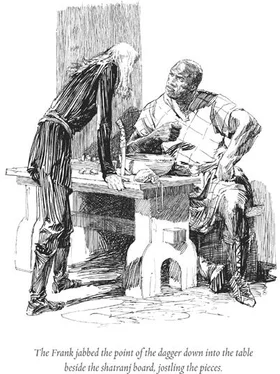Michael Chabon - Gentlemen of the Road
Здесь есть возможность читать онлайн «Michael Chabon - Gentlemen of the Road» весь текст электронной книги совершенно бесплатно (целиком полную версию без сокращений). В некоторых случаях можно слушать аудио, скачать через торрент в формате fb2 и присутствует краткое содержание. Жанр: Исторические приключения, на английском языке. Описание произведения, (предисловие) а так же отзывы посетителей доступны на портале библиотеки ЛибКат.
- Название:Gentlemen of the Road
- Автор:
- Жанр:
- Год:неизвестен
- ISBN:нет данных
- Рейтинг книги:3 / 5. Голосов: 1
-
Избранное:Добавить в избранное
- Отзывы:
-
Ваша оценка:
- 60
- 1
- 2
- 3
- 4
- 5
Gentlemen of the Road: краткое содержание, описание и аннотация
Предлагаем к чтению аннотацию, описание, краткое содержание или предисловие (зависит от того, что написал сам автор книги «Gentlemen of the Road»). Если вы не нашли необходимую информацию о книге — напишите в комментариях, мы постараемся отыскать её.
Gentlemen of the Road — читать онлайн бесплатно полную книгу (весь текст) целиком
Ниже представлен текст книги, разбитый по страницам. Система сохранения места последней прочитанной страницы, позволяет с удобством читать онлайн бесплатно книгу «Gentlemen of the Road», без необходимости каждый раз заново искать на чём Вы остановились. Поставьте закладку, и сможете в любой момент перейти на страницу, на которой закончили чтение.
Интервал:
Закладка:
“Cunegunde?” he said finally
“She was known by that name at one time,” Menashe said. “A dozen years ago, when she was part of the menagerie of the Count Palatine of Worms.”
For a moment the stranger abandoned all pretense of wariness and stood marveling at the beast as if, in that remote place between harsh mountains and a barbarian sea, he had come upon the great gray basilica of Worms itself Something in the stranger's face, his way of scrutinizing the elephant as if seeing through its rough integument to its giant organs and the ducts and sluices that served them, stirred a recollection in Joseph Hirkanos, so that he seemed, for his own part, to recognize the stranger as by a family resemblance, by the anatomist's keenness of his regard.
“Since you have risked a guess about Cunegunde, I will do the same with you,” he said. “Sir, you find yourself among Jews in a piteous estate. The hour of prayer is at hand and we are but ten in number, one sick and dying from some impurity of the blood. And so I dare to inquire, in the hope that the question will not be taken amiss, if perhaps the gentleman might not count himself among the sons of Abraham and Isaac, and so make our tenth?”
The stranger said nothing, gazing up at the pachyderm, who was long overdue for a wallow, her skin dusted with scurf and the residue of travel. He sighed, and the elephant sighed, too.
“Take me to the poor bastard,” the stranger said, “and I will see what I can do.”
They followed the nephew to the tent, striped and bulbous like a Radanite head wrap, in which the Italian lay silvered over with perspiration, eyes open and staring like a fish's. The stranger dropped his saddlebags and called for water to be heated. He knelt and removed his outer tunic and rolled the white sleeves of the inner one. He rubbed astringent oil into his hands and along his forearms to the elbow, to the amusement of the nephew, who drew a wrongheaded moral from the notion of a physician who medicated himself and not his patient. The stranger leaned in to sniff at the Italian's breath, pressed an ear against his chest and took the poor fellow's pulse. While he worked, he asked about the stages of the Italian's illness, and about the stations of the caravan's journey, and how things fared with the Jews of Regensburg, and the condition of the roads, and whether it was true that the kagan of the Khazars might by law be seen by no one but the bek, living in imperial isolation in a palace where he reigned at once absolute and powerless for a strict term until on an appointed day he was taken into a wood and strangled with a silk garrote. The Radanites replied that they had heard the same stories with regard to the kagan, but could add little more to them without falling into the sin of wicked speech.
“I know that's the unbreakable creed of the Radanites,” the stranger observed. “And yet it's a strange paradox that if one lightens a Radanite's wagons while freighting a Radanite's purse, he often finds himself in receipt of the most arrant gossip imaginable.”
Menashe Hirkanos invited the stranger to repeat his question at a later juncture, perhaps after having looked over some of their stock in gems or saddlery, and see if the reply he received then struck him as more informative.
At last the stranger concluded his examination and begged them all to leave him with the patient so that he could enact, in his own dry phrase, horrible and malodorous procedures. When, an hour later, with night having fallen, the stranger joined them for the evening worship, the Hirkanoses, having compared notes in the interval, greeted him with renewed interest, which by their nature they did their best to conceal. After they remembered their dead they sat down by a good fire, and the Sorb slave piled their plates with grilled lamb and rice boiled with onion and fat and filled their cups with wine. The stranger attended to his food without apparent pleasure and sipped his wine. Then he took out a small length of clay pipe or hollowed bone, filled it with a dark paste and lit it with a straw
“Regensburg,” he said. “I spent time there, as a student of physic, many years ago. In the Jewish street.”
“A golden lane of piety and learning,” Joseph Hirkanos suggested, “lighting the gloomy precincts of Christendom.”
“There was a family with whom I lodged. The family of Meshulem ben Hayim, noted physicians all.”
Joseph, Menashe, their Hirkanos cousins and the three other Radanites in the party, members of the Sac-erdoti clan based in Ragusa, maintained the agreed-upon silence, watchful and measured. The nephew snorted and then endeavored to transform the snort into a not very credible simulation of choking on his wine.
“A great family,” Joseph Hirkanos said, in the same bland way “A credit to our brothers in the West. But not one with which we are personally acquainted, alas, having never fallen ill in that city”
“I imagine their numbers have dwindled since then,” the stranger said. “They were never numerous to begin with. A few old bachelors and widowers, buried in their books. Pitiably tending to the bodies of the very nobles and burghers who condone the massacre of Jews by ignorant mobs.”
“I believe,” Joseph Hirkanos said, “that only one of that family remains.”
“Only one.”
“His name-” Joseph pretended to consult his brother with a look “-I believe it may be …”
“Solomon?” the stranger said eagerly, and Joseph understood for the first time how young he was. But he said nothing, and the others shook their heads in solemn ignorance or amnesia.
“You have a remarkable horse,” the nephew said, after a pause. “It's a shame that your saddle and harness are of such poor quality and so hard used.”
The Radanites turned to him and stared, none longer or with more astonishment than his uncle Joseph. The stranger's puzzlement vanished more quickly than that of the Radanites.
“Indeed,” he said. “I owe him better. In the morning I would like to see the best of your stock.”
“Your uncle is dead,” Joseph Hirkanos said. “Your father has abandoned all hope of your return.”
Zelikman ben Solomon smiled.
“He abandoned that years before I ever left Re-gensburg,” he said. “How is the old buzzard's health?”
“Weak. Once we have concluded our business in Atil, we intend to return to Regensburg, taking the more direct route. With God's help you could see him again before it is too late.”
“It was too late for him and me on the day that I was born,” Zelikman said.
“To forgive is a great blessing,” Joseph said. “But it is a greater one still to allow oneself to be forgiven.”
“The Radanite stations are comfortable and well provisioned,” Menashe said. “The consideration you paid in return for passage with us would hardly reflect the luxury you could expect.”
“The old boy doesn't have six months in him,” the nephew said.
Zelikman thought it over, slowly, seeming to visit in his pipe fancy the fog and clear sunshine, the deep fragrant forest, the cathedral bells.
“I accept your kind invitation,” Zelikman said. “My services as a physician ought just to offset my fare.”
The elephant gave a low moan, startling them, and a moment later they heard a faint trill, carried on the wind from off the river, and then another.
“Trumpets,” the nephew said.
They walked to the edge of the upland and saw tiny fires starring the eastern dark. The Brotherhood of the Elephant had at last arrived at the walls of Atil. Zelikman watched the pinpoints flicker with an air of uneasiness as if they formed the points of a constellation by which he hoped to steer a doubtful course.
“War,” Joseph Hirkanos said. “Bad for business.”
Читать дальшеИнтервал:
Закладка:
Похожие книги на «Gentlemen of the Road»
Представляем Вашему вниманию похожие книги на «Gentlemen of the Road» списком для выбора. Мы отобрали схожую по названию и смыслу литературу в надежде предоставить читателям больше вариантов отыскать новые, интересные, ещё непрочитанные произведения.
Обсуждение, отзывы о книге «Gentlemen of the Road» и просто собственные мнения читателей. Оставьте ваши комментарии, напишите, что Вы думаете о произведении, его смысле или главных героях. Укажите что конкретно понравилось, а что нет, и почему Вы так считаете.












